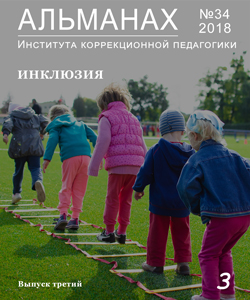Inclusion
Almanac #34 · Issue #34 · 2018

Institutionalization towards inclusive education of children with special needs
Keywords
Institutionalization towards inclusive education of children with special needs
inclusionintegration
special education
standards
educational route
Inclusive education of children with mental developmental delay: prerequisites and conditions of realization
Keywords
Inclusive education of children with mental developmental delay: prerequisites and conditions of realization
children with mental developmental delaymental development variant
special educational needs
educational route
inclusive education
psychological support
Differential approach to the assessment of educational achievements in learning adapted basic educational program for elementary general education in pupils with mental developmental delay i
Keywords
Differential approach to the assessment of educational achievements in learning adapted basic educational program for elementary general education in pupils with mental developmental delay i
mental developmental delaymonitoring
assessment
diagnostics
differentiation
special educational needs
special education
Inclusive education of children with locomotor apparatus impairment at the elementary school: choice of educational route
Keywords
Inclusive education of children with locomotor apparatus impairment at the elementary school: choice of educational route
integrationhandicapped children
elementary school
special education
diagnostics
psychophysical development
educational rout
special educational needs
Psychological and pedagogical diagnostics and choice of educational route for children with autism spectrum disorder
Keywords
Psychological and pedagogical diagnostics and choice of educational route for children with autism spectrum disorder
children with autismautism spectrum disorder
educational route
special educational needs
Special learning conditions at the elementary school for children with autism spectrum disorder. Dynamic model of integration
Keywords
Special learning conditions at the elementary school for children with autism spectrum disorder. Dynamic model of integration
children with autism spectrum disorderdynamic model of integration
special learning conditions at the elementary school
special educational needs
adapted educational program
Modern model of inclusion
Keywords
Modern model of inclusion
inclusive educationpsychological support
behavioral
neuropsychological
individual curriculum
varied learning
emotional-semantic approach
Peculiarity of volitional processes and proper social environment for a person with autism spectrum disorder
Keywords
Peculiarity of volitional processes and proper social environment for a person with autism spectrum disorder
autism spectrum disordervolitional processes
social environment
dialogic interaction
Inclusion: how to recognize a child with speech disorders through his writing
Keywords
Inclusion: how to recognize a child with speech disorders through his writing
inclusionoral and written speech
general underdevelopment of speech
written speech disorder
dyslexia
dysgraphia
acoustical
articulate
phonetic-phonemic underdevelopment of speech
phonemic analysis and synthesis
phonemic hearing
lexical
optical
grammatical
A blind child and sighted adults: how to communicate
Keywords
A blind child and sighted adults: how to communicate
educational institutionspecial educational needs
blind schoolboy
support
communication